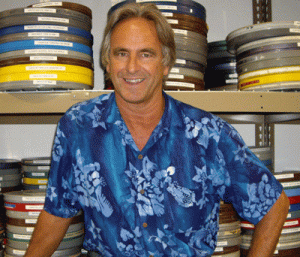Johns Hopkins UniversityEst. 1876
America’s First Research University

In 1996, the San Jose Police Department responded to a noise complaint at Geoff Alexander’s house: Alexander was showing his friends a series of 16 mm films bought from the city’s public library, projecting them onto a wall in his backyard. He was continuing a tradition from his days as a special education teacher in the 1970s, when he previewed academic films — science and humanities documentaries specially made for classroom settings — to find ones that would engage his students. Friends and neighbors would gather with hot dogs and beer to watch Shakespearean actors, magnified amoebas, and international stories projected larger than life.
After the police visit, Alexander began screening the films at a microcinema in a San Jose underground speakeasy. He went on to show 1,500 academic films over the next eight years, developing a cult following among audiences and a curiosity about the little-known creators and companies behind these films.
In 2001, he formed the Academic Film Archive of North America (AFA) to compile a history of this underappreciated film movement and to collect more 16 mm films and their accompanying curriculum materials, which would otherwise have been thrown away. By 2021, the AFA included 7,600 films and biographies for 82 filmmakers who worked on them from the early 1900s to the 1980s. He wrote two books documenting the genre and the largely forgotten filmmakers and companies that created the films.
We talked to Geoff Alexander to learn more about these extraordinary films and how the collection came to be housed at the Johns Hopkins Sheridan Libraries in 2022, in partnership with the Krieger School’s Program in Film and Media Studies.
The academic film genre was a hidden quarter of U.S. cinema. There were literally hundreds of educational film companies that hired great, brilliant, young filmmakers to make exceptional films. And few of them were very well known. Very few people thought that these films had any value, and they were going to landfills. So part of our mission was to elevate the genre and make sure these films were being saved.
As I began doing research on these filmmakers and companies, it became apparent that by collecting these films, we were helping to save a film genre from extinction.
Much of the science is as good today as it was in 1960, so they’re still valid educational films. And in terms of sociology, it’s important to keep original records for a historic perspective, even if our understanding of issues changes over time. We collected ethnographic films from all over the world, including cultures and ethnicities within the United States — one of the strongest parts of our collection relates to the Black American experience — recorded on 16 mm documentary film.
Another example is Je Parle Français: It was a landmark series of films made in the ’60s, because it was the first foreign language instruction series to have textbooks coordinated with films. Milan Herzog from Encyclopædia Britannica Films went to France, creating about 120 films with professional actors. In them, you see a France that no longer exists — people smoking in their living rooms, high-fashion dresses, folk traditions, etc.
Last year, we were told that we were losing our archival space, so we had 7,600 films plus ephemera that had to find a home. Initially I looked around the Bay Area, where we’re located. But then I thought, why don’t we find another location that doesn’t have a significant film archive so that we can serve that community?
I discovered that Johns Hopkins has a high-ranking film and media studies program. When I reached out, Adam Rodgers, the director of the film studies program, immediately got back to me. His enthusiasm was catching and worth a trip out to Baltimore.
I fell in love with the city. I fell in love with the people, and those in the film program like Adam and John Mann. I fell in love with Hopkins. I’m excited about Baltimore’s emergence on the map in terms of the film archival movement and making JHU’s Sheridan Libraries a destination film archive where people can find things that they can’t anywhere else in the world. I’m also really excited to see the first student film making use of this material — that’s going to make me delighted.
View digitized uploads of some of these academic films on Internet Archives.
Topics: Alumni, Faculty and Staff, Foundations, Krieger School of Arts and Sciences, Sheridan Libraries and University Museums, Fuel Discovery